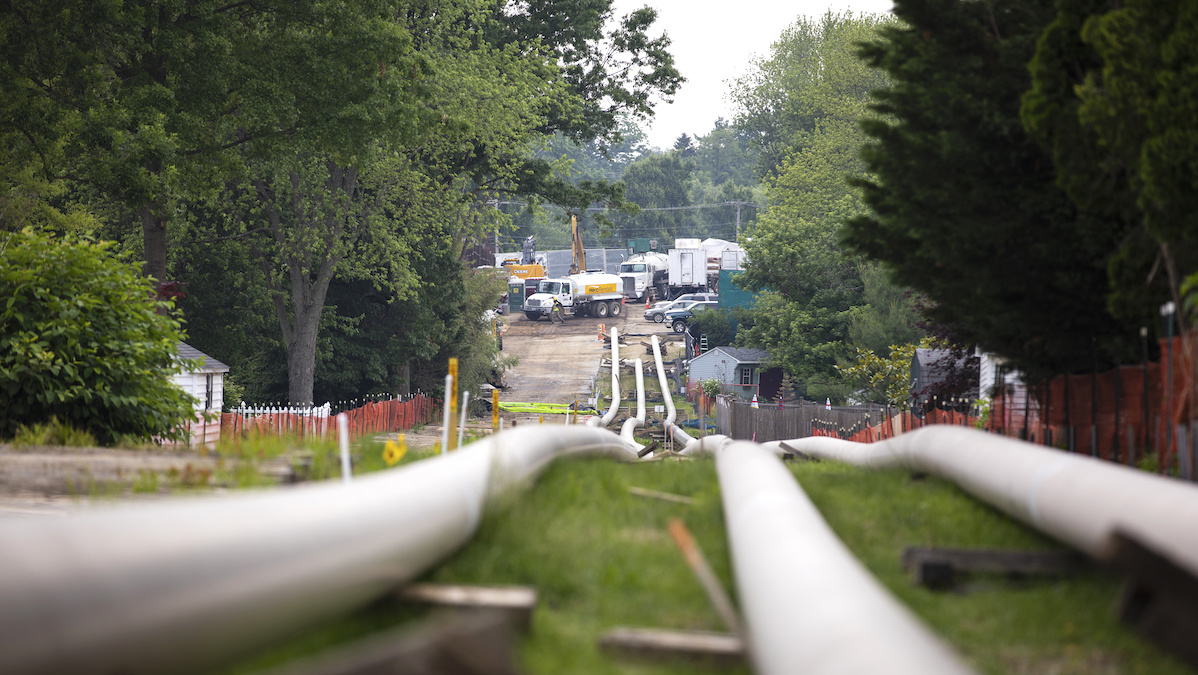
‘Another Blow to the Black Community’: Trump Waives Environmental Law That Gives Public a Voice in Infrastructure Projects

A pipeline being constructed in Pennsylvania. Robert Nickelsberg / Getty Images
President Donald Trump signed an executive order Thursday mandating federal agencies bypass key environmental reviews of energy and infrastructure projects.
Trump said the rule was designed to stimulate the economy in response to the coronavirus pandemic, but critics say the move will disproportionately impact communities of color amidst ongoing national protests following the police murders of George Floyd, Breonna Taylor and many other Black Americans. The order instructs agencies to work around the National Environmental Policy Act (NEPA), which gives communities a chance to weigh in on projects that would impact them, as NPR explained. Fossil fuel projects and highways tend to have a greater effect on Black and Brown communities, as HuffPost pointed out.
“Today President Trump is dealing another blow to the Black community, during a worldwide pandemic and nearly a week into nationwide Black Lives Matter protests against police brutality and structural racism,” House Natural Resources Chairman Raúl M. Grijalva (D-Ariz.) said in a statement reported by HuffPost. “Gutting NEPA takes away one of the few tools communities of color have to protect themselves and make their voices heard on federal decisions impacting them.”
NEPA was signed by Richard Nixon in 1970, NPR summarized. It requires federal agencies to review the environmental consequences of projects like pipelines and consult the public. It may also invoke the Endangered Species Act if vulnerable plants or animals would be threatened.
This isn’t the first time the Trump administration has targeted NEPA. It proposed a major rollback in January that would limit the length of the review process and the number of projects subject to it.
The current executive order gives the Transportation Department, the Department of Agriculture, the Department of the Interior, the Defense Department and the head of the Army Corps of Engineers 30 days to compile a list of expedited projects, The New York Times reported. The agencies were ordered to “use all relevant emergency and other authorities” to speed the projects.
“Unnecessary regulatory delays will deny our citizens opportunities for jobs and economic security, keeping millions of Americans out of work and hindering our economic recovery from the national emergency,” Trump wrote in the order.
However, environmental groups accused the administration of using the pandemic as a smokescreen for its broader deregulatory agenda. The U.S. Environmental Protection Agency (EPA) has already suspended the enforcement of clean air and water laws, HuffPost pointed out.
“When it comes to trying to unravel this nation’s environmental protection laws, this administration never sleeps,” professor of environmental law at Harvard University Richard Lazarus told The New York Times.
The new order is so broad that environmental groups say it may be vulnerable to legal challenges, according to NPR.
Lazarus agreed.
“The president’s assertion of authority to waive the application of environmental laws in the way described seems wholly untethered from law,” he said.
- Environmental Racism in Action: The Trump Administration's Plans ...
- 'Freeway Revolts' Helped Create the People's Environmental Law
- Environmental Negligence vs. Civil Rights: Black and Hispanic ...
- 15 EcoWatch Stories on Environmental and Racial Injustice ...
- In This Time of Crisis, We Need to Keep Our Eyes Open - EcoWatch
- Movement Grows to Declare Racism a Public Health Emergency - EcoWatch
- Trump Announces Final Rollback of Law That Gives Communities a Say in Fossil Fuel Projects - EcoWatch

 233k
233k  41k
41k  Subscribe
Subscribe 